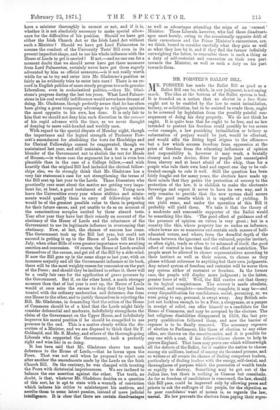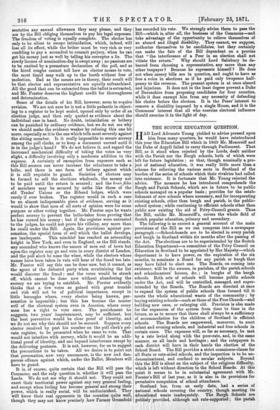MR. FORSTER'S BALLOT BTT.T..
MR. FORSTER has made the Ballot Bill as good as a Ballot Bill can be, which, in our judgment, is not saying much. The idea at the bottom of the Ballot system is bad. It is founded on a notion that an elector in a free State ought not to be enabled by the law to resist intimidation, bribery, or solicitation, but to be assisted to evade them, ought to be screened by legislation from the possibly painful con- sequences of doing his duty properly. We do not think he ought. It is quite true that he ought to be free, and no law intended to protect his freedom could possibly be too severe —for example, a law punishing intimidation or bribery as subornation of perjury would be just, would be effectual, and would affix the fitting legal stigma to the offence— but a law which secures freedom from oppression at the price of freedom from the educating influences of opinion and responsibility is, however it may work, a brutally clumsy and rude device, fitter for people just emancipated from slavery and at heart afraid of the whip, than for a people who rule their own land and expect one day to be cul- tivated enough to rule it well. Still the question has been fairly fought out for many years, the electors have made up their minds that they prefer the protection of secrecy to the protection of the law, it is childish to make the electorate Sovereign and expect it never to have its own way, and it only remains to provide that the new system shall secure all the good results which it is capable of yielding. It can yield some, and under the operation of this Bill it probably will yield them. We take it that the theory of a moderate and reasonable supporter of the Ballot would. be something like this. The good effect of guidance and of the pressure of opinion on voters is very great ; but in a country like this, where property has so undue an influence, where towns are so numerous and contain such masses of half- educated voters, and where, from the dreadful depth of the chasm between the ignorant and the cultured, popular instinct, so often right, tends so often to be ashamed of itself, the good effect of control is less than the evil effect of restriction. The people must be allowed to choose representatives according to their instinct as well as their reason, to choose as they please without referenoe to anything but their own judgments. Any mixed system of freedom and restraint will be worse than any system either of restraint or freedom. In the former case, the people will display more judgment ; in the latter, greater force of will.' Well, the Bill carries out that theory- in its logical completeness. The secrecy is made absolute, universal, and complete—needlessly complete, it may be—and every disqualification for candidature, social, pecuniary, or, we were going to say, personal, is swept away. Any British sub- ject not luckless enough to be a Peer, a clergyman, or a pauper in receipt of relief, can offer himself as a candidate for the House of Commons, and may be accepted by the electors. The last religious disabilities disappeared in 1859, the last pro- perty qualification followed them, and now the barrier of expense is to be finally removed. The necessary expenses of election to Parliament, like those of election to any other office, are thrown on the constituencies, and it is possible for any one with a coat, if his fellow-citizens choose, to help to govern England. That boon may prove one which willoutweigh all the defects of the Ballot, for it enables the nation to choose among six millions, instead of among six thousand persons, and so widens at all events its chance of finding competent leaders, particularly of finding leaders with the energy, self-denial, and thoroughness of purpose which the possession of wealth tends so rapidly to destroy. Something may be got out of the Julian line, but there is nothing in Crassus but crassitude. As far as freedom of candidature is concerned, the law, should this Bill pass, could be improved only by allowing peers an priests to ask the suffrages of the people, for the objection as to poor candidates' want of means is, as regards the law, unreal. No law prevents the electors from paying their repre-
sentative any annual allowance they may please, and they are by the Bill obliging themselves to pay his legal expenses. The freedom of voting is equally complete. The elector has only to be silent to escape intimidation, which, indeed, will lose all its effect, while the briber must be very rich or very confiding to pay a scoundrel to commit perjury, when he can get his money just as well by telling his corrupter a lie. The rowdy licence of nomination-day is swept away ; no passions are to be excited by a premature declaration of the poll, and as the hired roughs cannot tell how an elector means to vote, the most timid may walk up to the booth without fear of molestion. Bad as the means are in theory, their result will be that elector and representative are equally enfranchised. All the good that can be extracted from the ballot is extracted, and Mr. Forster deserves the highest credit for thoroughness and determination.
Some of the details of his Bill, however, seem to requira revision. We are not sure he is not a little pedantic in object- ing to a register to be kept sealed, opened only by order of an election judge, and then only quoted as evidence about the individual case in hand. No doubt, intimidation or bribery can be punished by ordinary evidence, but we do not see why we should make the evidence weaker by refusing this one bit more, especially as it is the one which tells most severely against the sitting member. Is it really impossible to secure secrecy among the poll clerks, or to keep a document unread until it is in the judge's hand ? We do not believe it, and regard the increased mechanical difficulty of taking the votes as very slight, a difficulty involving only a moderate addition to the expense. A certainty of exemption from exposure such as this Bill secures can never increase the reluctance to take a bribe, and there is one form of bribery against which
it is still requisite to guard. Societies of electors may be formed to sell the elections wholesale, the money not to be paid until the return is secured ; and the bona fides of members may be secured by oaths like those of the old Trades' Unions or the Riband lodges, which were rarely if ever broken. The register would in such a case be an almost indispensable piece of evidence, serving as it would to show that men of all sorts of opinion were for some purpose or other voting together. Mr. Forster says he wants perfect secrecy to prevent the bribe-taker from proving that he has earned his money ; but if the register were entrusted to the judges, he could not prove his villainy, any more than he could under the Bill. Again, the provisions against per- sonation, the special form of evil which the ballot develops,
are inadequate. This mischief has reached an astounding height in New York, and even in England, as the Bill stands, any scoundrel who knows the names of men out of town but upon the register may go and vote in every district of London, and the poll clerk be none the wiser, while the electors whose names have been taken in vain will hear of the fraud too late. Mr. Forster will say this can be done now, but it cannot, as the agent of the defeated party when scrutinizing the list would discover the fraud ; and the votes would be struck off, which cannot be done now without abandoning the secrecy we are trying to establish. Mr. Forster evidently thinks that a few votes so gained with great trouble and risk will not be of political importance, except in little boroughs where, every elector being known, per- sonation is impossible ; but this has become the master evil of the electoral system even in America, where every man has a right to vote once. The punishment he suggests, two years' imprisonment, may be sufficient, but the best preventive would be clear proof of identity, and we do not see why this should not be secured. Suppose every elector received by post his number on the poll clerk's pri- vate register, to be presented when he came to vote. That would not interfere with secrecy, while it would be an addi- tional proof of identity, and one beyond interference except by the delivering postmen. It is not, however, for us to suggest the precautions to be taken. All we desire is to point out that personation, now very uncommon, is the new and dan- gerous offence against which, under the Ballot, Members will have to guard. It is, of course, quite certain that the Bill will pass the Commons, and the only question is, whether it will pass the Lords. We do not see why it should not. They could not exert their territorial power against any very general feeling, and except when feeling has become general and strong their power, which is really social, will be undiminished. They will know their real opponents in the counties quite well, though they may not know precisely how Farmer Greenfield
has recorded his vote. We strongly advise them to pass the Bill—which is, after all-, the business of the Commons—and take advantage of the opportunity to relieve themselves of an absurd and illegal disability. They cannot, we suppose, authorize themselves to be candidates, but they certainly can make the fate of the Bill dependent on a proviso that " the interference of a Peer in an election shall not vitiate the return." Why should Lord Salisbury be de- barred from choosing a representative, any more than any other taxpayer Because he represents himself I He does not when money bills are in question, and ought to have as free a voice in elections as if he paid only twopence half- penny to the revenue. The present system is at once absurd and injurious. It does not in the least degree prevent a Duke of Devonshire from proposing candidates for four counties, while it does exempt him from any necessity of defending his choice before the electors. It is the Peers' interest to remove a disability imposed by a single House, and it is the Commons' interest that all who exercise electoral influence should exercise it in the light of day.



































 Previous page
Previous page